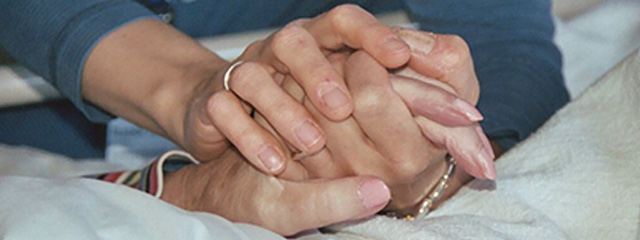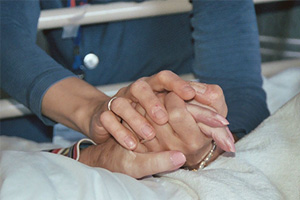 Lois Staffin, MSW, LCSW, who volunteered her psychotherapy skills at The Oscar and Ella Wilf Campus for Senior Living in Somerset, understands how older adults are less apt to open up about their deepest feelings – like grief – and more comfortable keeping them inside.
Lois Staffin, MSW, LCSW, who volunteered her psychotherapy skills at The Oscar and Ella Wilf Campus for Senior Living in Somerset, understands how older adults are less apt to open up about their deepest feelings – like grief – and more comfortable keeping them inside.
“This is a generation that may not be forthcoming about feelings so you need to be attune about how to approach them,” she says.
Lois, who wears a volunteer badge when visiting the seniors once a week, tells them that she is a psychotherapist and the one to go to if they have something on their minds.
“I really have to pull it out of them, though,” she states, noting that she assesses the seniors based on her interaction with them.
Plus, she says, “I depend upon what the staff tells me. I will stop at the nursing station and ask if they notice anything of concern.”
When it comes to coping with loss, whether it comes in the form of losing a spouse, child, dear friend, or even losing independence or something else of note, older adults should seek out a resource like Lois or anyone else eager to lend a helping hand in order to get the healing they need.
“One thing that I would try to do is encourage them to reach out to a family member,” advises Staffin, who started a group of about 10 seniors on campus that discusses intellectual topics such as anti-Semitism but also gives them the opportunity to express their feelings without feeling threatened.
Staffin was a psychotherapist in a private practice up until five years ago. After she retired, she volunteered at a battered women’s shelter before deciding to lend her skills at the Wilf Campus.
“Most older adults, in talking with their families, usually focus on how they are enjoying the activities, atmosphere, relationships and food as a resident instead of zeroing in on deeper matters,” she shares.
“Families should not ignore it, because it is very easy for them to see that their parent is well taken care of and fed, etcetera. But, what the family needs to say is ‘I know you are doing well, is there anything you would like to talk to me about?’” says Staffin.
Wilf’s director of corporate marketing, Toby Ehrlich, is also a licensed clinical social worker and certified assisted living administrator with over 35 years of experience working with older adults and their families. In that capacity, she offered presentations on the topic of coping with loss in the golden years.
Loss, notes Ehrlich, may also be experienced when an older adult must make a move or lifestyle changes, or when one loses good health, youth, or even wealth.
“Acknowledging and identifying loss is extremely important. Often people feel sad, angry, depressed or anxious, even shocked and they don’t realize that they are feeling a loss,” she says. “These feelings can be frightening and the person may feel out of control.”
Ehrlich adds, “Grief can be a roller-coaster of many ups and downs.”
In acknowledging that these feelings are a normal reaction to loss, she advises the following tips:
- Write down your feelings in a diary
- Speak with a friend you trust or a friend who has experienced a similar loss in the past
- Ask for help from a professional, a Rabbi you trust, therapist or seek out a bereavement group or online chat group
- Take care of yourself and don’t ignore the symptoms of the grief you are experiencing
- Exercise and sleep
- Maintain proper nutrition
- Go for regular check-ups.
“If someone you love or are friends with suffers a loss, you can help them by taking care of them, asking them about their feelings, spending time with them and being a good listener,” adds Ehrlich.
She notes that, since grief can be triggered by anniversaries, birthdays or holidays, it is often helpful to honor the person you have lost in a different way, for example by a small family get together and sharing.
In her article, “Dealing With Loss and Grief,” which appeared in the Senior Citizen Journal in 2010, Sharon Shaw Elrod, MSW EdD, writes specifically on the loss experienced by senior women who have lost their husbands.
She notes that such losses can leave a life in shambles, however, she writes, “We are also bright enough to know friendships and our social life in general contribute positively to quality of life in our senior years.”
“So it stands to reason that rebuilding our social life after losing a partner can prevent stress and help us get through the grieving process…,” says Elrod.
“Studies in several countries over the past decade reveal widowed people with a social life and friendship support system cope with their grief more effectively,” she says. “Trusted friends with whom you can talk with provide a much-needed support system.”
For more information about Stein Hospice or any of the other senior living and care options available at Wilf Campus, contact us at (732) 568-1155, [email protected] or visit us at www.wilfcampus.org.

